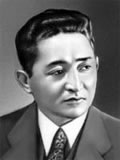Hamid Olimjon
From Wikipedia, the free encyclopedia
Hamid Olimjon (sometimes spelled Hamid Alimjan in English; Uzbek: Ҳамид Олимжон; Hamid Olimjon; Russian: Хамид Алимджан; Khamid Alimdzhan; 12 December 1909 – 3 July 1944) was an Uzbek poet, playwright, scholar, and literary translator of the Soviet period.[1] Hamid Olimjon is considered to be one of the finest twentieth-century Uzbek poets. The Uzbek Soviet Encyclopedia calls him "one of the founders of Uzbek Soviet literature".[4] In addition to writing his own poetry, Hamid Olimjon translated the works of many famous foreign authors, such as Alexander Pushkin, Leo Tolstoy, Maxim Gorky, Vladimir Mayakovsky, Taras Shevchenko, and Mikhail Lermontov into the Uzbek language.
Hamid Olimjon Хамид Алимджан | |
|---|---|
 | |
| Born | Hamid Olimjonov[1] 12 December 1909 Jizzakh, Russian Turkestan |
| Died | 3 July 1944 (aged 34) Tashkent, Uzbek SSR, Soviet Union |
| Occupation | poet, playwright, scholar, and literary translator |
| Notable awards | Lenin Komsomol Prize (1973)[2] Order of Outstanding Merit (2004)[3] |
Hamid Olimjon was married to the renowned Uzbek poet Zulfiya. He died in a car accident on 3 July 1944, in Tashkent. He was 34 years old at the time of his death.
Life
Hamid Olimjon was born on 12 December 1909 in Jizzakh.[5] Hamid Olimjon's father died when he was only four years old. From 1918 until 1923, he studied at Narimonov Elementary School in Jizzakh.
Hamid Olimjon studied at the Samarkand Pedagogical University from 1923 until 1928. From 1928 until 1931, he studied at the Uzbek Pedagogical Academy.[6] Hamid Olimjon became a member of the Communist Party of the Soviet Union in 1942.[6]
In 1935, he married the renowned Uzbek poet Zulfiya.[7] He died in a car accident on 3 July 1944 in Tashkent.[5][8]
Work
Summarize
Perspective
Hamid Olimjon started to write poetry during his student years. In 1926, he published his works in the Zarafshon newspaper. In 1927, he became an editor of that newspaper.
Hamid Olimjon's first collection of poems, Koʻklam (The Spring), was published in 1929.[4] He also published many other collections of poetry, including Tong shabadasi (Morning Breeze) (1930), Olov sochlar (Fiery Hair) (1931), Oʻlim yovga (Death to the Enemy) (1932), Poyga (The Race) (1932), Daryo kechasi (The River's Night) (1936), Chirchiq sohillarida (On the Banks of Chirchiq) (1937), Sheʼrlar (Poems) (1937), Oʻlka (Country) (1939), Baxt (Happiness) (1940), Qoʻlingga qurol ol! (Take up a Weapon!) (1942), Ona va oʻgʻil (Mother and Son) (1942), and Ishonch (Trust) (1943). In 1928, he wrote two collections of short stories, namely Tong shabadasi (Morning Breeze) and Haqiqat izlab (Seeking Truth).
Hamid Olimjon also wrote many epic poems such as Ikki qizning hikoyasi (The Story of Two Girls) (1937), Oygul bilan Baxtiyor (Oygul and Baxtiyor) (1937), Zaynab va Omon (Zaynab and Omon) (1938), and Semurgʻ yoki Parizod va Bunyod (Semurg or Parizod and Bunyod) (1939). He also collected and published the Uzbek epic poem Alpomish for the first time in 1938.[4]
Hamid Olimjon also authored plays that remain popular to this day in Uzbek theaters. Among his most famous plays are Muqanna and Jinoyat (The Crime).
In addition to writing his own poetry, Hamid Olimjon translated the works of many famous foreign authors, such as Alexander Pushkin, Alexander Serafimovich, Konstantin Simonov, Leo Tolstoy, Lord Byron, Maxim Gorky, Mikhail Lermontov, Mikhail Svetlov, Nikolai Ostrovsky, Oleksandr Korniychuk, Pavlo Tychyna, Taras Shevchenko, Vera Inber, and Vladimir Mayakovsky into the Uzbek language. Hamid Olimjon's works in turn have been translated into many other languages.
Hamid Olimjon extensively studied Uzbek classic literature.[6] In 1943, he became a correspondent member of the Academy of Sciences of the Uzbek SSR.[1] As a member of the committee that was established to celebrate the 500th anniversary of Ali-Shir Nava'i's birth, Hamid Olimjon studied Nava'i's life and work and published numerous scholarly articles on this subject.[5] He also played an important role in translating Nava'i's works into Russian. Hamid Olimjon became executive secretary of the Writers' Union of the Uzbek SSR in 1939 and held this position until his death in 1944.
Translations of literary works
Hamid Olimjon translated many works into the Uzbek language. He translated Pushkin's " Kavkaz asiri " and " Suv parisi," Mikhail Lermontov's story "Bela" from his narrative " Zamonamiz qahramoni," Gorky's " Chelkash " stories, N. Ostrovsky's novel " Poʻlat qanday toblandi," A. Korneychuk's play " Platon Krechet Platon Krechet," and also some poems by poets like Byron, Pushkin, Shevchenko, P. Tichina, M. Bezimenskiy, M. Svetlov, K. Simonov, and V. Inber.[9][10][11][12][13][14]
Family
Family: Zulfiya Isroilova (1915–1996) was a poet, journalist, translator, and public figure. She was named the People's Poet of Uzbekistan in 1965 and received the title of Hero of Socialist Labor in 1984.[15][16]
Daughter: Hulkar[14]
Brother: Sarvar Azimov (1923–1994) was a Soviet and Uzbek writer, a state figure, and a diplomat.[17][18][19]
Heritage and legacy
Hamid Olimjon passed away at the age of 35 as a result of a car accident. One of the Tashkent Metro stations, the Literary House of the Writers' Union, and the Regional Theater in Samarkand were named after Hamid Olimjon. In the city of Tashkent, a square was dedicated to him with the name of the poet (in 1990), and a neighborhood in the vicinity of this area was also named in honor of the poet.[11][12][20][13][14] He was posthumously awarded the Order of Outstanding Merit on 23 August 2004.[3]
Published works
Collection of perfect works (5 volumes). Tashkent, "Fan" 1975-1984 years.
References
Bibliography
External links
Wikiwand - on
Seamless Wikipedia browsing. On steroids.
